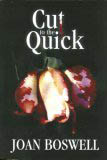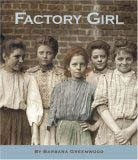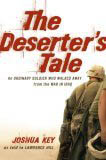
Cut to the Quick
paperback $14.95

Factory Girl
hardcover $22.95

A Deserter's Tale
hardcover $29.95
September 2007
Another cutting murder mystery
Toronto writer Joan Boswell's first mystery, Cut Off His Tale, was unusual in that it featured almost equally two crime-solving protagonists—both female. The short and dumpy Ottawa detective Rhona Simpson both collaborated and competed with the murder victim's widow, the largish Hollis Grant, in tracking down the clues and eventually confronting the killer.
When, near the end of that novel, Simpson indicated she may be transferring to Toronto, I figured the series would be following the officer there for future cases.
And it did. But in the second novel, Cut to the Quick, Grant is coincidentally—and what would mysteries be without coincidences?—also visiting Toronto during that case and the murder victim is again someone close to her. So once more the amateur involves herself in the investigation, occasionally helping the police but more often checking out leads on her own.
I fear Hollis Grant is on her way to becoming one of those ladies, like Agatha Christie's Miss Marple or TV's Jessica Fletcher, who stumble across bodies wherever they go and make a point of continually outwitting the professional sleuths. This can be annoying to those who like their whodunits more realistic. Personally I'd prefer more emphasis on the harder-boiled police investigation.
Yet, Boswell's combination of the British-styled cozy and the American procedural is carried out very well. While the first book in the series is a mystery worth reading, especially for the characters' backgrounds, Cut to the Quick is written more proficiently. Gone are some of the adverbial and adjectival over-explanation that slowed down the earlier tale.
The son of a famous and arrogant Toronto artist is killed by someone who tampered with his motorcycle. Other members of the family, with whom Grant is staying, are threatened and attempts are made on their lives. As usual, there are too many suspects: jealous artists, a former agent, worshipping art students, a hostile ex-wife, a secret fiancée, members of a militant anti-eugenics league.... Boswell adeptly works the investigation by both cops and Hollis around Toronto, building up cases against all the suspects, and seeming to nearly reach conclusions before throwing in twists that send us off in different directions.
I have to admit that, as with the first novel, I'd picked the culprit about three-quarters of the way through, but that's always the biggest thrill for me: guessing the solution before the detectives—but just before. And it was a guess in both cases. I didn't really have it worked out. Then when all was revealed, it was quite satisfying.
And now it seems I am hooked on Hollis and Grant and I hope the next in Boswell's "Cutting" series will again star them both, however improbable that would be in real life.
Weaving fiction and eye-opening fact
Normally I don't cover "kids books", but this one is different.
For one thing, it's very serious, exploring the hard life of North American child labourers in the early 1900s and the efforts to end their exploitation.
Not that it's put that way. The story is told in chapters alternating between fiction and non-fiction. The novelistic sections depict work in the garment industry as seen by 12-year-old Emily who has to support her family alongside other, mainly immigrant girls in the same situation. It's an affecting story of the young being overworked and cheated by tyrannical bosses, and yet being afraid to fight the system. When a reporter comes around to check out the sweatshop, it's the workers themselves who chase him away, terrified they might lose their miserable jobs and incomes if trouble is caused.
The alternate sections are straightforward explication: history and social lessons putting Emily's story in context. Short, highly readable articles focus on city life at the time, working conditions, and reform movements—complete with sometimes heartrending photos by crusading journalists of the day.
My only problem with this is that we're usually not told which cities are being discussed or shown. I suspect many of the examples are taken from New York. This is okay but I'm left wondering how the situation in Toronto compared.
Nonetheless Factory Girl is an educational book, without the boring, negative connotations of that description. I didn't intend to read the whole of this "kids book" but found myself turning pages to learn more.
Toronto writer Barbara Greenwood specializes in weaving fact and fiction to explain history for children. But this book could be an eye-opener for older kids and adults alike.
Going AWOL from Iraq to Canada
"Iraq is not Vietnam," I'm told by those who are irked by what seems to them a kneejerk equation of the two conflicts by opponents of the war.
Despite being an antiwar protester myself, I agree the two wars are different. But, lordy, there are a lot of similarities.
One of them being that Canada is again receiving American deserters from an overseas conflict.
Not draft-dodgers, mind you. That is a major difference this time around: no draft in the United States. But some young men who refuse to fight are again seeking refuge north of their country's borders.
One of them is Joshua Key, a gun-loving, patriotic, Oklahoma-raised lad who did a stint in Iraq and then made his way to Toronto, rather than go back to battle. At least that's how he tells it and Lawrence Hill reports it in The Deserter's Tale, subtitled "The story of an ordinary soldier who walked away from the war in Iraq".
Key claims that as a young father with a poor education and few prospects he was inveigled into joining the army to get training and financial support for his young family—with an explicit promise that he would not be sent into combat. Despite discovering very quickly he had been tricked, however, he accepted his commission to go to Iraq, completely buying into President George Bush's rationale for the invasion. Much of The Deserter's Tale details his nightmarish experiences there, including taking part in persecutions of innocent Iraqis and witnessing apparent atrocities, such as his fellow American soldiers playing soccer with the heads of decapitated insurgents.
The process of a gung-ho soldier turning into a fugitive from his own country is something you'—ll have to read to see if you agree that he was right to run away. He certainly did not make the decision lightly.
However, oddly enough, I—a vigorous opponent of the war and supporter of deserters—am not entirely convinced by the book. Part of the problem is, I think, that Lawrence Hill is too good a writer. The Burlington-based author of the recent The Book of Negroes has a wonderfully straightforward, understated style that lets a story stand on its own merits without any gussying up.
But I feel that I'm hearing the voice of Lawrence Hill when I'm reading The Deserter's Tale, rather than that of Joshua Key. It's too calm. Too just-the-facts, however horrendous those facts may be. I don't hear the very angry, mixed up, sick at heart, torn-apart young man that Key must have been. Even his thinking out loud about his quandaries—what should he do? should he tell his wife? what would his parents think?—is all too orderly, too reasonable.
It makes it more difficult to accept his conversion and his flight as the result of the kind of anguish that one has to live through to understand.
I still support his right to go AWOL and to win refuge here but I wish his story were told more inspiringly.
— Eric McMillan
